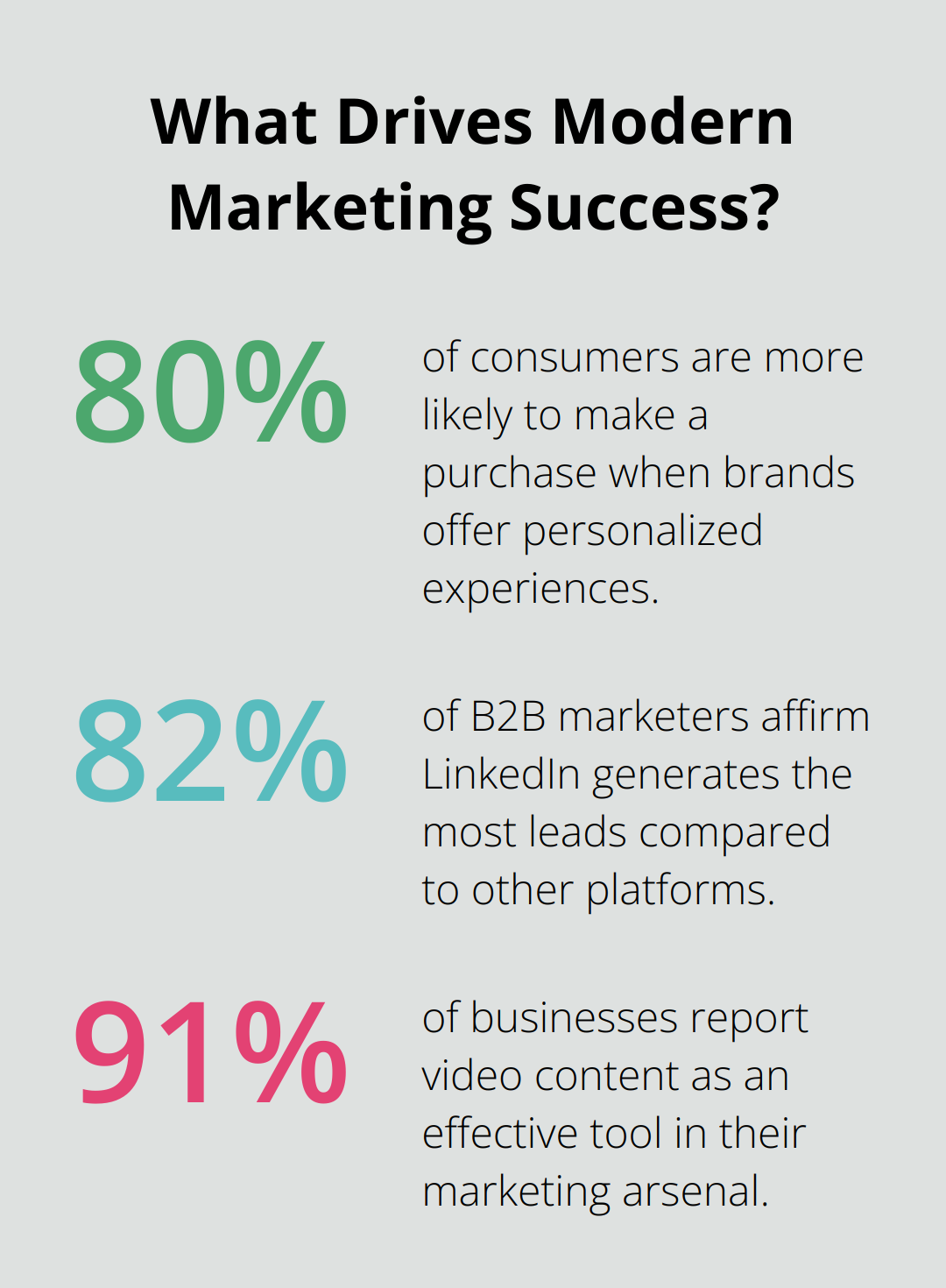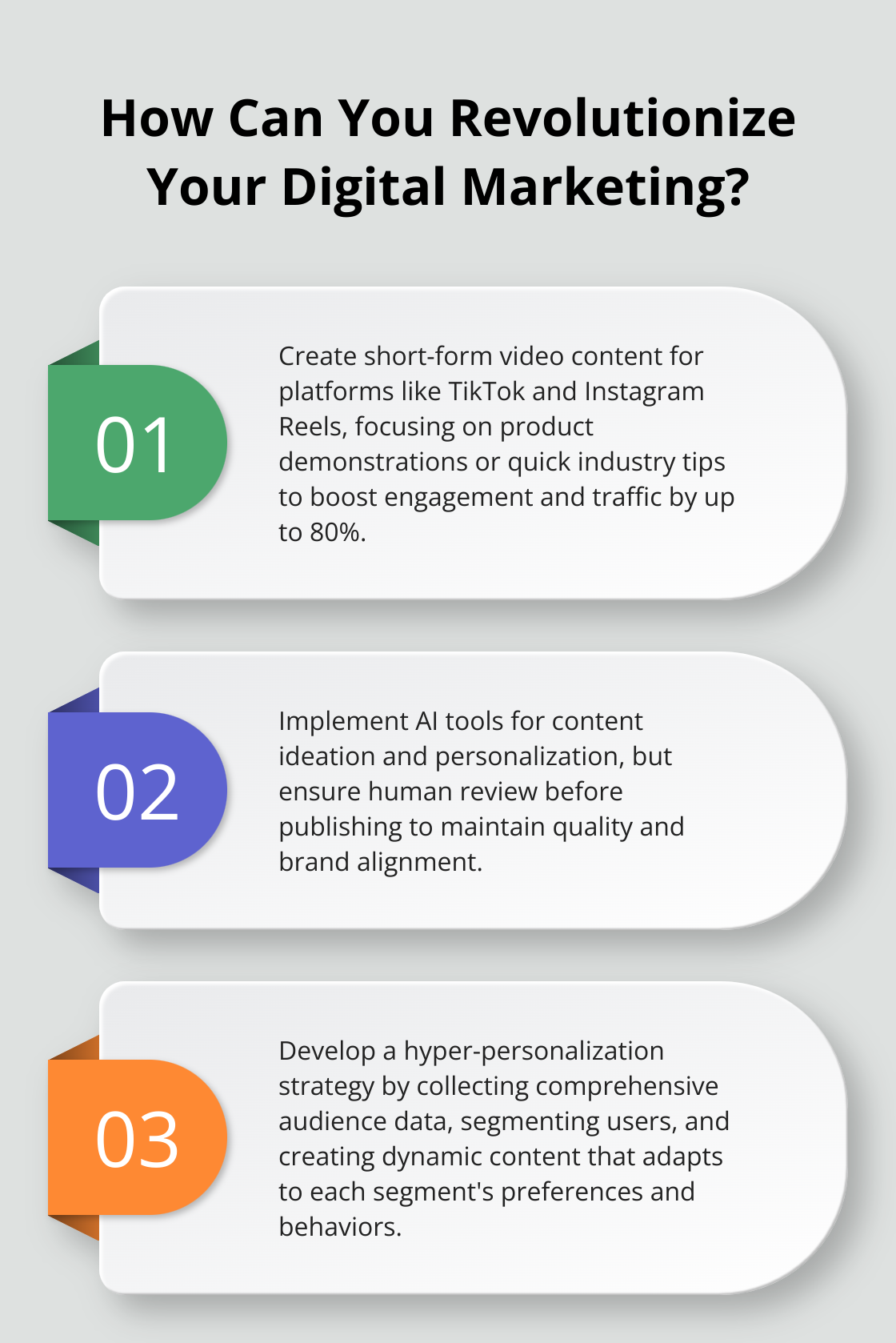Content marketing growth statistics reveal a rapidly evolving landscape. Businesses are investing more in content strategies, recognizing their potential to drive engagement and conversions.
At Made Simpler, we’ve analyzed the latest trends and metrics to bring you a comprehensive overview of the content marketing industry. This post will explore adoption rates, key performance indicators, and emerging trends that are shaping the future of content marketing.
How Is Content Marketing Evolving?
Content marketing is evolving at breakneck speed. The landscape shifts rapidly, with adoption rates soaring across industries and budgets expanding to meet the growing demand for quality content.
Widespread Adoption Across Sectors
Content marketing has experienced a surge in adoption. The Content Marketing Institute reports that 73% of B2B marketers and 70% of B2C marketers now incorporate it as a key strategy. This widespread embrace extends beyond tech or media companies; industries from healthcare to manufacturing recognize the power of content to engage audiences and drive business growth.

The universal appeal of content marketing stems from its ability to educate, inform, and build trust with potential customers, regardless of the industry. Companies across diverse sectors seek expertise to develop comprehensive content strategies that align with their unique business goals.
Shifting Budget Priorities
As content marketing proves its worth, businesses allocate more resources to these efforts. A striking 54.5% of businesses plan to increase their content marketing budget in 2024 compared to 2023 (as reported by Siege Media and Wynter). This shift reflects a growing understanding of content marketing’s long-term value and its ability to generate leads and drive conversions.
The investment extends beyond content creation. A significant portion of budgets now focuses on content distribution and promotion, ensuring that high-quality content reaches its intended audience. Social media advertising, influencer partnerships, and paid content discovery platforms have become integral parts of content marketing strategies.
Video Reigns Supreme
When it comes to content types, video has emerged as the undisputed champion. A staggering 91% of businesses now use video as part of their marketing strategy (according to Wyzowl). This popularity isn’t surprising, given that video content can increase organic traffic by up to 70% when included in articles (as reported by Semrush).
Short-form videos, in particular, dominate the content landscape. Platforms like TikTok and Instagram Reels have become powerful tools for brands to connect with audiences, especially younger demographics. Many companies leverage these platforms to create engaging, shareable content that resonates with their target market.
Diverse Content Mix Remains Essential
While video reigns supreme, a diverse content mix remains crucial for comprehensive strategies. Blog posts, infographics, and podcasts continue to play vital roles in content marketing. The key lies in tailoring content types to specific audiences and business goals.
For instance, long-form blog posts provide in-depth information and boost SEO efforts. Infographics, shared by 26% of marketers, can increase website traffic by up to 12% (DemandSage, 2023). Podcasts also gain traction, with 47% of marketers planning to boost their audio content budget in 2024 (HubSpot State of Marketing Report, 2024).
As we explore the evolving content marketing landscape, it’s essential to examine the key performance metrics that drive success in this dynamic field. Let’s turn our attention to the crucial indicators that measure the effectiveness of content marketing strategies.
How Effective Is Content Marketing
Content marketing’s effectiveness shines through key performance indicators (KPIs) that reveal its impact on business goals. Let’s explore the most important metrics for content marketing success.
Return on Investment (ROI)
Content marketing outperforms traditional marketing in terms of ROI. Email marketing requires a significantly lower investment compared to traditional marketing channels like radio, TV or print advertising. This cost-effectiveness makes it an attractive strategy for businesses of all sizes.
Email marketing, a subset of content marketing, yields an average ROI of $42 for every $1 spent (Litmus). This staggering return highlights the power of well-crafted, targeted content in nurturing leads and driving conversions.
Engagement Rates Across Platforms
Engagement rates vary significantly across different platforms and content types. Video content leads the pack, with 91% of businesses reporting it as an effective tool in their marketing arsenal. Short-form videos on platforms like TikTok and Instagram Reels have seen particularly high engagement rates, often outperforming longer formats.

On social media, LinkedIn stands out for B2B marketers, with 82% affirming it generates the most leads compared to other platforms. For B2C marketers, Instagram and Facebook continue to drive high engagement, especially with visual content.
Conversion Rates for Different Content Types
Conversion rates differ based on content type and industry. Blog posts remain a powerful tool, with businesses that blog seeing 165% more lead growth compared to those that don’t (HubSpot). However, the quality and relevance of content significantly impact conversion rates.
Case studies and whitepapers tend to have higher conversion rates for B2B companies, with 62% of B2B buyers preferring this practical content when making purchasing decisions. For B2C companies, user-generated content and customer reviews often drive higher conversion rates, building trust and authenticity.
Interactive content (such as quizzes or calculators) generates 52.6% more engagement than static content, often leading to higher conversion rates. This increased engagement translates to more time spent on site and a greater likelihood of conversion.
The Power of Personalization
Personalized content significantly boosts effectiveness. According to Epsilon research, 80% of consumers are more likely to make a purchase when brands offer personalized experiences. This trend extends to content marketing, where tailored content resonates more strongly with target audiences.
Companies that leverage data-driven personalization in their content strategies (including email campaigns, product recommendations, and targeted blog posts) see higher engagement rates and improved ROI. The key lies in understanding audience segments and delivering relevant, valuable content to each group.
As we move forward, the content marketing landscape continues to evolve. New trends emerge, reshaping how businesses connect with their audiences and drive results. Let’s explore these emerging trends and their potential impact on content marketing strategies.
What’s Shaping Content Marketing’s Future?
Content marketing undergoes rapid transformation, driven by technological advancements and changing consumer behaviors. These shifts reshape the industry landscape, presenting new opportunities and challenges for marketers.
The Video Revolution
Video content has become a cornerstone of effective content strategies. A staggering 91% of businesses now use video as a marketing tool (a 63% increase over the past three years). This surge yields tangible results – articles containing video content receive over 80% more traffic than those without.

Short-form videos dominate the scene. Platforms like TikTok and Instagram Reels have become powerhouses for brand engagement, especially among younger demographics. In fact, 56% of marketers plan to focus on short-form video as a primary strategy in 2024.
Businesses should create bite-sized, engaging video content that aligns with their brand voice and resonates with their target audience. This could include product demonstrations, behind-the-scenes glimpses, or quick tips related to their industry.
AI’s Growing Influence
Artificial Intelligence revolutionizes content creation and distribution. A remarkable 83.2% of content marketers plan to utilize AI content generation tools to assist their content marketing efforts in 2024.
AI finds application across various aspects of content marketing:
-
Content Ideation: 71% of content marketers use AI tools for content ideation (including keyword brainstorming).
-
Personalization: AI algorithms analyze user behavior to deliver highly targeted content, improving engagement rates.
-
Content Creation: While only 3% of marketers use AI for writing complete articles, many use it for drafting outlines or generating initial ideas.
-
Performance Analysis: AI-powered analytics tools help marketers understand content performance and optimize strategies in real-time.
To stay competitive, businesses should explore AI tools that can enhance their content marketing efforts. However, maintaining a human touch remains essential – 93% of marketers review AI-generated content before posting, ensuring quality and brand alignment.
Hyper-Personalization Takes Center Stage
Personalization has moved beyond simply addressing customers by name. Today, it involves delivering highly relevant content based on individual preferences, behaviors, and needs.
Research shows that 80% of consumers are more likely to make a purchase when brands offer personalized experiences. This extends to content marketing, where tailored content significantly boosts engagement and conversion rates.
Implementing a hyper-personalization strategy involves:
-
Data Collection: Gather comprehensive data on your audience’s preferences, behaviors, and interactions.
-
Segmentation: Divide your audience into specific groups based on shared characteristics.
-
Dynamic Content: Create content that adapts based on user data, delivering a unique experience to each segment.
-
Continuous Optimization: Regularly analyze performance metrics and refine your personalization strategy.
These emerging trends – video content, AI integration, and hyper-personalization – enable businesses to create more engaging, effective content marketing strategies. The landscape continues to evolve, and success in content marketing requires adaptability and innovation.
Final Thoughts
Content marketing growth statistics reveal a rapidly expanding field. Video content dominates, with 91% of businesses leveraging it in their strategies. Short-form videos on platforms like TikTok and Instagram Reels have become focal points for engagement, while AI tools assist in various aspects of content creation and analysis.

Hyper-personalization will play a key role in future content marketing efforts. Businesses that deliver highly relevant, personalized content will likely see higher engagement and conversion rates. Companies should invest in video content, explore AI tools, and focus on data-driven personalization to stay competitive.
Made Simpler offers comprehensive marketing solutions to help businesses navigate this evolving landscape. Our expertise and tools can help companies create effective, tailored content strategies that drive results. As content marketing continues to evolve, staying informed about the latest trends and statistics will remain essential for sustainable growth.

